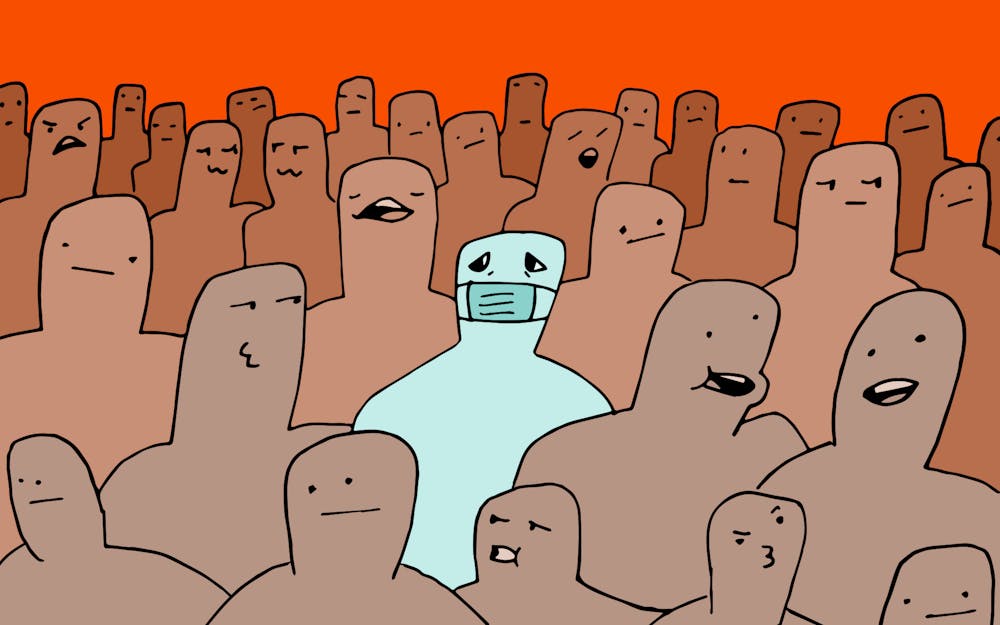If I thought I was anxious before, the COVID-19 pandemic said “You want to see some real speed?” Catastrophizing is part of my typical routine anyway, so a deadly pandemic only compounded my daily stream of (anxious) consciousness.
Though I’ve seen a handful of friends here and there at safe distances or after negative testing, I’ve long dreamed of going to restaurants and large indoor gatherings once again. I understand some people have been engaging in those activities throughout the pandemic — and that’s their right, as long as they are following local and state guidelines. Personally, however, large gatherings continuously give me shortness of breath and heart palpitations.
The vaccine was supposed to change that. But I’m still skeptical.
I’m not skeptical about whether the vaccine actually works — I trust the science. But I’ve been living in this state of fear since last March. My anxiety has even led to quiet disapproval of others, even though previously dangerous activities are slowly becoming safer.
Am I being paranoid?
Truthfully, no. I’m not being paranoid. Many people are nervous about post-pandemic gatherings because the world has endured a collective sustained trauma for more than a year now, inducing looming threats of anxiety and nervousness about becoming infected or infecting others.
Post-traumatic stress disorder can arise because a traumatic event — like the COVID-19 pandemic — often triggers a heightened emotional response in humans. This likely developed as an evolutionary advantage to avoid danger, but it can extend beyond what is actually necessary for survival.
Symptoms of PTSD, anxiety and depression are exacerbated among people with preexisting psychiatric disorders: A survey of 2,000 hospitalized outpatients in China found 20.9% saw intensified symptoms throughout the pandemic.
So then where does that leave me, a moderately anxious person who has been fully vaccinated? I’ve received mixed reactions from friends and family when I describe my anxiety about places reopening and events resuming. Some are understanding, but others are somewhat confused. If I’m protected against COVID-19, what do I have to be afraid of?
Regardless, I’ve just been taking life at my own pace. I’ve assessed each situation and its level of risk as it arises.
For example, I’ve eaten at two restaurants indoors — something I never would’ve considered only a few months ago. I even attended my cousin’s outdoor wedding after most attendees and I got vaccinated. Though I was extremely nervous and suffered a mild panic attack, I came out unscathed and without the novel coronavirus.
But at the end of the day, it’s really nobody else’s business how I, or how others, decide to reenter the world. Because it will take time for vaccinated people to emerge from the trauma, starting slow and getting your feet wet may be the key, according to Monica Gandhi, professor of medicine at the University of California, San Francisco.
I don’t recommend vaccinated people act recklessly and defy local mandates, as vaccination is a privilege not everyone has been afforded. However, I do recommend forgiving yourself for engaging in small — but safe — acts of normalcy even though feelings of reservation are still valid.
If the pandemic has taught me anything, it’s how truly varied societal perceptions may be.
Personally, I’ve found it hard to separate my anxieties from my judgment of others.
But I’m working on it.
Something that makes me anxious may not incite the same feeling in others. And because I’m an imperfect college student, I have also engaged in various risky behaviors. I don’t have any room to judge someone else for doing something I’d likely forego. All I ask is that others do the same and refrain from judging me.
Natalie Gabor (she/her) is a junior studying journalism with minors in business marketing and philosophy. She hopes to one day find a career that tops her brief stint as a Vans employee.





